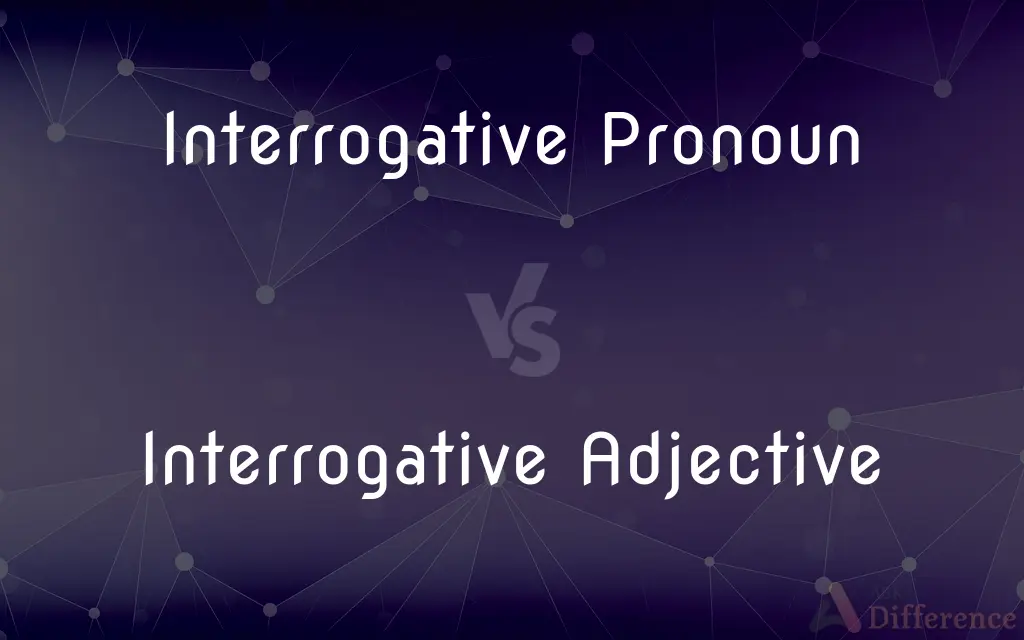Interrogative Pronoun vs. Interrogative Adjective — What's the Difference?
By Tayyaba Rehman — Published on January 11, 2024
Interrogative Pronouns stand alone for unknowns ("Who called?"), while Interrogative Adjectives modify nouns ("Which book?").

Difference Between Interrogative Pronoun and Interrogative Adjective
Table of Contents
ADVERTISEMENT
Key Differences
Interrogative pronouns are used to replace the unknown element we are asking about in a sentence. They stand alone as the subject or object of a clause. For example, "Who is at the door?" Here, 'who' is the interrogative pronoun standing in for the person at the door.
Interrogative adjectives, on the other hand, are used to modify nouns or pronouns, asking about a specific item from within a known set. They cannot stand alone and must be followed by the noun they modify. For example, in the question "Which book did you read?", 'which' is the interrogative adjective that modifies 'book'.
Interrogative pronouns typically include words like who, whom, what, which, and whose. Each of these words can be used to ask about people or objects, serving as the placeholder for the answer. "Whom did you see?" uses 'whom' as the object interrogative pronoun.
Interrogative adjectives are part of the questions that we form to inquire about specific nouns. They are often the same words as interrogative pronouns (which, what, whose) but are used differently. In "What time is it?", 'what' is an interrogative adjective modifying 'time'.
Interrogative pronouns can often be identified by their usage in a sentence without a noun following them. They are the main players in the question. "What broke?" does not need additional information to be a complete question because 'what' stands on its own.
ADVERTISEMENT
Interrogative adjectives need the support of a noun to make sense in a question. They are never the main focus of the sentence but always point to the noun they modify. In "Whose car is this?", 'whose' is an interrogative adjective providing information about 'car'.
Comparison Chart
Function in a sentence
Replaces the unknown element
Modifies a noun
Can it stand alone?
Yes
No
Examples
Who, whom, what
Which, what, whose
Followed by a noun?
No
Yes
Type of questions formed
Open-ended
Specific to a noun
Compare with Definitions
Interrogative Pronoun
A pronoun used to ask questions about people or objects.
Who called?
Interrogative Adjective
Qualifies or modifies nouns, indicating questions.
What time is dinner?
Interrogative Pronoun
Forms questions by inquiring about the identity of something or someone.
What is your name?
Interrogative Adjective
Determines or inquires about the identity or quantity of a noun or noun phrase.
Which tickets did you buy?
Interrogative Pronoun
Takes the place of the noun that is the subject or object of a question.
Whom do you trust?
Interrogative Adjective
Used to inquire about specific instances of a noun.
What book are you reading?
Interrogative Pronoun
Seeks additional information about someone or something.
Which is yours?
Interrogative Adjective
An adjective used with nouns to ask questions.
Which path should we take?
Interrogative Pronoun
It often starts a question and is followed by the verb.
Whose is this?
Interrogative Adjective
Always precedes a noun in a question.
Whose shoes are these?
Common Curiosities
What is an interrogative adjective?
It's an adjective used with a noun to ask questions.
Can interrogative pronouns and adjectives be the same word?
Yes, 'what' and 'which' can be both, depending on their use in a sentence.
What is an interrogative pronoun?
It's a pronoun used to ask questions about persons or objects, without needing to accompany a noun.
Can an interrogative adjective be used without a noun?
No, it must modify a noun.
Are there different forms of interrogative pronouns?
Yes, such as 'who' for subjects and 'whom' for objects.
Can you give an example of an interrogative pronoun in a sentence?
"What happened last night?"
How can I identify an interrogative adjective in a sentence?
It directly precedes a noun, as in "Which book is yours?"
How does an interrogative pronoun function in a sentence?
It takes the place of the noun that answers the question.
Do interrogative pronouns always start a sentence?
They often do but can also appear after a preposition or in the middle of a sentence.
Can interrogative adjectives form a question by themselves?
No, they need to be part of a larger question structure with a noun.
Can interrogative pronouns and adjectives be plural?
Yes, depending on what you are asking about, such as "Whose are these shoes?"
Can the use of an interrogative adjective change the type of answer expected?
Yes, because it narrows down the scope of the question to a specific item or set of items.
Is 'whose' always an interrogative pronoun?
No, it can function as an interrogative adjective as well.
What role does an interrogative adjective play in a sentence?
It modifies a noun to specify which one is being inquired about.
How do interrogative pronouns differ from relative pronouns?
Interrogative pronouns ask questions, while relative pronouns link clauses to nouns.
Share Your Discovery

Previous Comparison
Fact Table vs. Dimension Table
Next Comparison
Crystal Malt vs. Caramel MaltAuthor Spotlight
Written by
Tayyaba RehmanTayyaba Rehman is a distinguished writer, currently serving as a primary contributor to askdifference.com. As a researcher in semantics and etymology, Tayyaba's passion for the complexity of languages and their distinctions has found a perfect home on the platform. Tayyaba delves into the intricacies of language, distinguishing between commonly confused words and phrases, thereby providing clarity for readers worldwide.












































